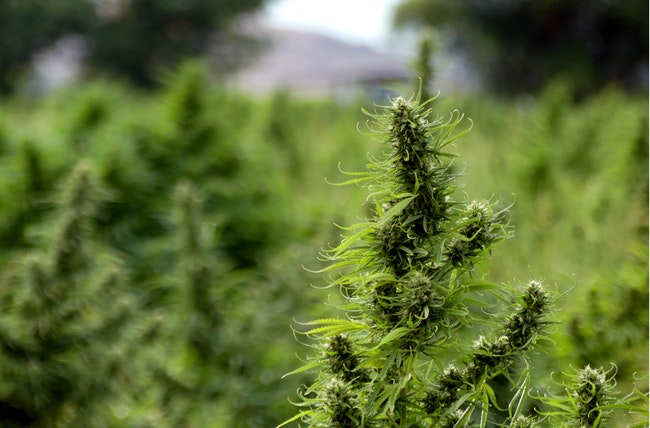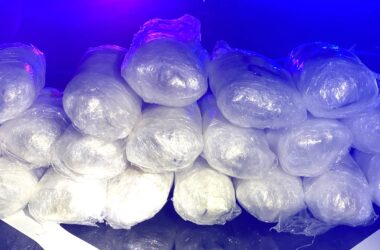 A hemp field east of Vale. (The Enterprise/file)
A hemp field east of Vale. (The Enterprise/file)
VALE – Hemp is a relatively new crop in Malheur County, and while it promises lucrative returns for cultivators and CBD producers, a formidable learning curve faces anyone who hopes to grow it successfully.
Stuart Reitz, Malheur County extension agent, said that the outcome of this season’s hemp harvest is variable.
“Some people seem to be doing well, and other people are kind of struggling along trying to figure out how to do things,” Reitz said.
This appraisal was echoed by area hemp and medicinal marijuana farmers who recently concluded their harvest.
In addition to sharing how this year’s harvest went, they also shared the issues related to growing the plant that they encountered and in some cases, overcame.
Reitz said that individuals who are established farmers have it a little easier than those who are newer to farming.
However, across the board, local hemp growers faced some unexpected challenges this season.
Some of the struggles for hemp growers, Reitz said, include the size of the hemp plant, as well as the weeding process, which has to be done by hand and requires sizable investments in money and time.
Jim Hutchens of Treasure Valley Extraction, started his company last year and is dedicated to the extraction of CBD oil, a natural organic oil that contains a chemical known as cannabidiol.
CBD oil can be found in both marijuana and hemp, and it is increasingly common to find the oil being sold over-the-counter for the treatment of a variety of ailments including arthritic pain and epilepsy.
Hutchens, a retired military pilot, who said he invested $2 million dollars into the extraction facility at the former Ontario Golf Course, explained the primary obstacles associated with growing hemp.
For one, Hutchens said, “there is no infrastructure or machinery that has been confidently developed that works.”
“So, we are hiring people to do the whole thing by hand,” Hutchens said of the harvest.
Craig Froerer, a Nyssa famer, planted about 500 acres of hemp, starting in May and finishing in June.
Froerer said that he used a CLAAS forage harvester, the same machinery used to harvest corn, to harvest 400 acres of his hemp.
The other 100 acres, Froerer said, he is harvesting by hand.
Froerer said that it took about four days to harvest the 400 acres with the forage harvester, and that he has spent a month harvesting the 100 acres by hand and recently was only half done.
Hutchens said that this year’s harvest was about the same as last year, and that one of the biggest problems for farmers is in the labor that is needed to harvest the crop.
When it comes to hemp, it is not as simple as just harvesting with combines as is the preferred method with other crops, as the flower portion of the plant, containing the coveted oil, needs to be carefully separated from the stems.
Froerer agreed, and said there is no doubt that the 400 acres of plants he harvested with the forage harvester have been damaged. However, Froerer said he decided to go mechanical purely for economic reasons and has yet to find out exactly how valuable his crop will be as it hasn’t been processed yet.
Froerer expects there to be some loss in quality as far as CBD content, however, it is difficult to determine without the extraction processing actually being done.
“There is a problem with the learning curve in the industry,” Hutchens said. “A lot of new farmers that are getting into it are taking on more acreage than they have manpower to deal with.”
In the past, Hutchens has advised farmers looking to get into the business to start small.
[ KEEP YOUR LOCAL NEWS STRONG – SUBSCRIBE ]
Erin Gibbons and Matthew Sam, two local hemp farmers, and farm managers at Coughing Crow Apothecary & Farm located in Nyssa, also advised starting small.
Gibbons said that when she and Sam first started talking about planting the crop, they were considering five acres.
“We pared that down to a half acre,” Gibbons said. “I don’t know what we would have done with five acres of hemp. We would have been drowning.”
Gibbons said that she heard of farmers in the area who were not as successful this season as they’d hoped to be.
“I think that people who have not been successful with this and are going to try again, what we have been hearing is that people are going to dial it way back,” Gibbons said.
For a small operation, Gibbons said, it is labor intensive, and for Gibbons and Sam, their harvest team consisted of friends and family.
“When we can get our business off the ground and can hire employees we will do so,” Gibbons said.
Starting in August, Gibbons and Sam started working eight- to 12-hour days and didn’t stop until the crop was out of the ground. The reason for this was the frost.
“We had a couple of really cold nights where Matt and our other partner got up with a propane heater and walked around the garden to keep the plants from dying,” Gibbons said.
Hutchens said that at a past town hall meeting, it was stressed to new hemp growers the importance of starting small.
Another reason for starting small is cross-pollination between male and female plants.
“If you miss the male plants, when the males start to go into pollination, you have to kill them, and if they cross pollinate with the females then… you can ruin crops for miles around,” Hutchens said.
Gibbons and Sam experienced similar issues with cross-pollination, but said there wasn’t much they could do to prevent it.
Gibbons said it is nearly impossible to determine whose crops are cross-pollinating given that the pollen travels across the winds for miles. There are no contraptions, like screens, that are capable of filtering the pollen, Gibbons said.
“We just have to cross our fingers,” Gibbons said. “Another option would be to go to the neighbors and to sue for ruining our investment, but we don’t want to do that.”
“It’s happening all over the state. Hemp farms are suing each other left and right when inexperienced farmers come in and ruin a neighbor’s season because they don’t know what they’re doing,” Gibbons said.
Gibbons said that her and Sam walk their fields constantly to make sure that there is no cross-pollination.
Another problem with hemp, Hutchens said, is the plunging temperatures.
Given that many people planted the crop without exactly grasping what it takes to harvest it, they are left in trouble as temperatures drop, threatening their crops.
“People have dollar signs in their eyes,” Hutchens said. “They don’t realize the labor and production costs eat up a lot of that money.”
“There are thousands of acres and they have no idea how to harvest it or dry it,” Hutchens said.
Gibbons said that even though she and Sam were well prepared, and have experience growing the crop, they still lacked enough space to dry their plants after they were harvested.
“We overgrew what we estimated and we were kind of scrambling,” Gibbons said.
Gibbons said they got last-minute help with harvesting to save the crop.
“I can’t imagine not being prepared for that and not having any plan and then getting there and not knowing what to do,” Gibbons said.
Sam’s experience comes from three years of growing medicinal marijuana.
“And when hemp came down the line, it just fit in with our program,” Sam said.
Froerer said that his operation is different because while many people use dry processing, he is doing wet processing.
Froerer plans to continue harvesting the 100 acres by hand despite the onset of cold temperatures.
“You might lose some leaf and stuff, most of the CBD oil is in the bud anyway,” Froerer said. “I have enough different varieties there is a big difference in frost tolerance by variety.”
Froerer offered a bit of advice to anyone looking to get into the business.
“You better get a thick stomach because there are lots of ups and downs in this world… its really volatile, your emotions really swing. If I had to do it all over again I wouldn’t be as aggressive as I was this year,” Froerer added.
News tip? Contact reporter Joe Siess: [email protected] or 541-473-3377.
For the latest news, follow the Enterprise on Facebook and Twitter.
SUBSCRIBE TO HELP PRODUCE VITAL REPORTING — For $5 a month, you get breaking news alerts, emailed newsletters and around-the-clock access to our stories. We depend on subscribers to pay for in-depth, accurate news produced by a professional and highly trained staff. Help us grow and get better with your subscription. Sign up HERE.




